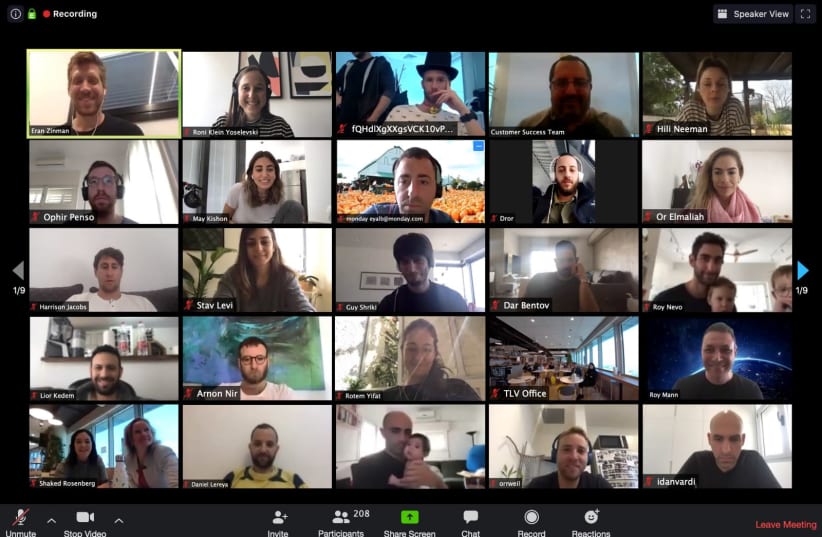In the space of just a few weeks, the world has shifted en masse from the busy workplace to the kitchen table.
The business boardroom has been almost instantly replaced by video conferencing and remote planning online, and solutions including Zoom, Slack and even Israeli-developed monday.com have increasingly become household names.
While many employees are already eager to return to the office, especially parents balancing childcare and working at home, the novel coronavirus outbreak may leave a permanent mark on the workplace.
"I think the outbreak will change the world, as people open up to remote work and see the benefits and negatives," monday.com co-founder and CTO Eran Zinman told The Jerusalem Post in a video call. "It is harder if you have kids, it is a bit more of a challenge. We did a job interview on Zoom and it was fine."
Co-founded in 2012 by Zinman and Roy Mann, Tel Aviv-headquartered team management platform developer monday.com boasts 100,000 paying customers in over 180 countries and is enjoying rapid growth. While not initially intended for crises such as the current outbreak, the cloud-based system has assisted companies embracing remote work for some time. In recent weeks, however, interest has spiked.
"The world is going through a transformation. We will learn a lot from it and evolve as a society. We are in a position where we have a responsibility to help that," Zinman said.
Since the start of the outbreak, usage of monday.com's platform has increased by 60% - in China, usage has soared by 200%. The company expects a similar swell in Italy and other locations.
Last month, the company - which raised $150 million in funding in July 2019 at a $1.9 billion valuation - announced the launch of monday 2.0, providing a comprehensive work operating system for enterprises.
"A lot of the way people work is going to change following the outbreak, including the bias towards not hiring remotely," said Mann, who serves as chief executive of monday.com. "People will opt-in to that option more. I think something is definitely starting here."
Last week, the company offered "free and complete use" of its platform to all non-profit organizations working to fight the coronavirus outbreak, and to universities implementing remote lecturing systems.
"Working from home due to the coronavirus outbreak amplifies the huge trend that has happened with remote work until now," Mann said. "Companies are becoming global and a lot of people are working as freelancers. Every large company has a lot of them that it needs to manage anyway."
The peak in interest in remote collaboration is also a boon for the likes of video conferencing company Zoom, which has been adopted by businesses, hospitals, university lecturers, and friends and family in isolation. Shares in the Nasdaq-listed company, based in San Jose, have soared in value while the remainder of the stock market has plummeted.
Seeking to capitalize on increased interest, the company announced that it would be lifting its 40-minute limit on meetings for free users located in China and for tens of thousands of K-12 schools worldwide.
"Given this coronavirus, I think overnight, almost everybody really understood they needed a tool like this," Zoom founder and CEO Eric Yuan said during an earnings call earlier this month, GeekWire reported. "This will dramatically change the landscape. I truly believe in the future, everyone will [use] video for remote worker collaboration."
